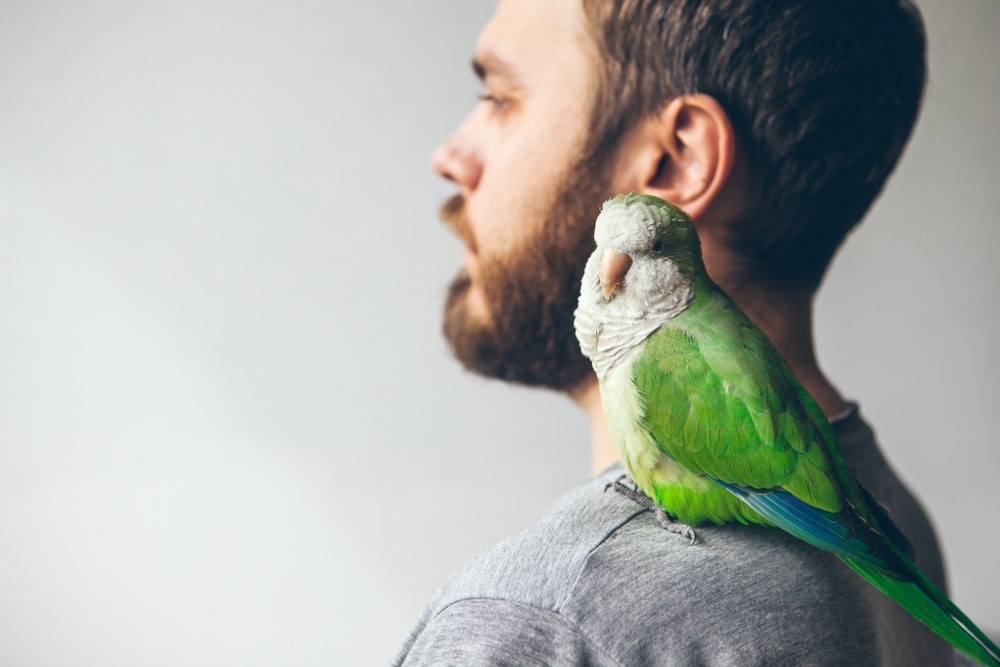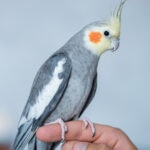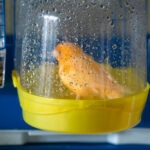Bird Heart Health

Photo by Chewy
The avian heart is an amazing organ. Because birds are so athletic, they have relatively bigger hearts than that found in mammals. (Anyone who has shared a home with a bird knows about their big hearts!)
Not only is the heart bigger in birds, but it also beats a lot faster, relatively. For example the cardiac output (the blood flow out of the heart) is about seven times greater in a flying budgerigar (parakeet) than in a person or dog at maximum exercise level! Birds also must have a higher blood pressure than mammals to go along with that increased blood flow from the heart.
Anatomically, birds have four chambers to the heart, which is the same amount as mammals. They are: right and left atrium, and right and left ventricle.
You don’t hear much about birds and heart disease, but it does occur, although not as often as it occurs in mammals. Do birds get heart attacks? Well, that’s a complex question. Birds have an excellent blood supply to their heart muscle, as would be expected with an athletic animal. A heart attack occurs when, over time, the blood vessels that supply the blood, oxygen and nutrients to the heart muscles become obstructed to the point that the muscle cells begin dying.
The most common reason for obstruction to the heart’s blood vessels is from atherosclerosis, which is a buildup of plaques inside the blood vessels. This seems to occur most often in African grey parrots but can occur in any parrot species.
In people, it was discovered that there were Chlamydophila organisms (the primitive bacteria responsible for psittacosis) under some plaques in the blood vessels. This is an interesting discovery, and one that I have not heard diagnosed in birds, but one that warrants further study, since the connection between birds and psittacosis is well-known.
Other heart conditions are more common in older birds, including congestive heart failure. This occurs when the heart no longer acts as an effective pump, and the blood supply to the kidneys is often compromised.
In some cases, there is fluid in the sac around the heart itself, preventing it from pumping optimally. In other cases, the heart may become too muscular or too flabby, with both conditions causing ineffectual pumping. If the right side ventricle fails (or both ventricles are failing), then usually there is an enlarged liver, fluid found in the body tissues (called edema) and also excessive fluid in the body cavity. If the left ventricle fails, there is usually excess fluid in the lung tissue.
When performing a physical exam on a pet bird, your avian veterinarian will auscult (listen to with a stethoscope) to the heart, lungs and air sacs of your bird. The heart rate and rhythm will be evaluated.
Most birds have a really fast heart rate, and it is easier to evaluate when under anesthesia, as the rate often slows down. Some birds have an arrhythmia, meaning that the heart rhythm isn’t always the same, and may speed up or slow down based on breathing or for other reasons. Some birds may have a heart murmur, which means that there is abnormal blood flow in the heart and through one or more of the valves. This in itself doesn’t mean that the bird had a problem, but those identified with a heart murmur should be followed more closely and undergo a cardiac work-up either before a problem occurs or if signs of a heart problem begin to show up.
A cardiac work-up includes baseline blood tests, radiographs to evaluate the heart, lungs, air sacs, liver and other internal organs, and perhaps an echocardiogram or electrocardiogram or special dye studies of the heart and blood vessels. I also suggest testing for Chlamydophila, although testing is never 100 percent in a live bird.
Older birds, overweight birds and perhaps inbred birds are more likely to develop heart disease. I have seen a few cases of congenital or developmental heart disease, as well.
Foster Heart Health In Your Parrot
What can we do to keep our birds’ hearts healthy? The obvious suggestion and one that also goes for owners, too, is to stay at a healthy weight. Have your bird consume food that is appropriate for its species, and make sure that it doesn’t over-consume calories. If necessary, provide foraging materials and toys to entice your pet bird to work to acquire some of its food. Discuss the appropriate foods to feed your pet bird with your avian vet. Get a good-quality gram scale, and weigh your pet birds on a weekly basis, at the same time of the day, to monitor for any changes.
If practical, allow your pet bird to fly for exercise. If flight is too dangerous, due to the risk of escape or injury, make sure that your bird has a large enough cage and toys to play with and also a playgym for supervised play time outside of the cage.
One technique to encourage weight loss is to provide a long ladder going from the playgym to the floor. When you walk by, place the pet bird on the floor in front of the ladder, and have it climb back up to the gym again and again. This ladder-climbing exercise helped my adopted overweight female budgie, Lucy, which had liver disease, to lose weight.
Get creative with play to keep your bird’s heart pumping faster on a regular basis. Practice wing flapping by dropping your hand while your parrot is perched on your hand. Always check with your avian vet before changing your bird’s diet, as it is possible for a sub clinically ill bird to become overtly sick from the stress of the dietary changes. Ditto about starting an exercise program if it has never exercised much in the past.
I recommend plant-derived omega fatty acids as a supplement for heart health. I take omega fatty acids for my heart, but they are fish-oil based; for birds, I recommend plant-based. A good combination of heart-healthy oils is this recipe: 24 ccs of corn oil and six ccs of either flax seed or safflower oil, dosed at 0.1 ml per 100 grams of body weight orally once a day. This was listed as a renal-specific (kidney) anti-inflammatory but as plant-derived omega fatty acids go, this should also work for heart health. Again, ask your avian vet for his or her recommendations regarding any supplements.
While heart disease isn’t among the most common medical problems in pet birds, it still can and does occur. Please do what you can to keep your bird in good health, including heart health.
By: Chewy Editorial
Featured Image: Via Veera/Shutterstock



